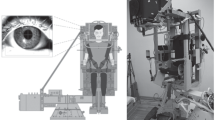Summary
Reflex responses that depend on human otolith organ sensitivity were measured before, during and after a 10 day space flight. Otolith-spinal reflexes were elicited by means of sudden, unexpected falls. In weightlessness, “falls” were achieved using elastic cords running from a torso harness to the floor. Electromyographic (EMG) activity was recorded from gastrocnemius-soleus. The EMG response occurring in the first 100–120 ms of a fall, considered to be predominantly otolith-spinal in origin, decreased in amplitude immediately upon entering weightlessness, and continued to decline throughout the flight, especially during the first two mission days. The response returned to normal before the first post-flight testing session. The results suggest that information coming from the otolith organs is gradually ignored by the nervous system during prolonged space flight, although the possibility that otolith-spinal reflexes are decreased independent of other otolith output pathways cannot be ruled out.
Similar content being viewed by others
References
Backman SB, Watt DGD (1979) Effects of altered gravity on a human otolith-spinal reflex. Soc Neurosci Abstr 5: 362
Fernandez C, Goldberg JM (1976) Physiology of peripheral neurones innervating otolith organs of the squirrel monkey. I. Response to static tilts and to long-duration centrifugal force. J Neurophysiol 39: 970–984
Greenwood R, Hopkins A (1976a) Muscle responses during sudden falls in man. J Physiol (Lond) 254: 507–518
Greenwood R, Hopkins A (1976b) Landing from an unexpected fall and a voluntary step. Brain 99: 375–386
Kenyon RV, Young LR (1986) M.I.T./Canadian vestibular experiments on the Spacelab-1 mission: 5. Postural responses following exposure to weightlessness. Exp Brain Res 64: 335–346
Lacour M, Xerri C, Hugon M (1978) Muscle responses and monosynaptic reflexes in falling monkey. Role of the vestibular system. J Physiol (Paris) 74: 427–438
Melvill Jones G, Watt DGD (1971a) Muscle control of landing from unexpected falls in man. J Physiol (Lond) 219: 727–737
Melvill Jones G, Watt DGD (1971b) Observations on the control of stepping and hopping movements in man. J Physiol (Lond) 219: 709–727
Reschke MF, Anderson DJ, Homick JL (1984) Vestibulospinal reflexes as a function of microgravity. Science 225: 212–214
von Baumgarten R, Benson A, Berthoz A, Brandt T, Brand U, Bruzek W, Dichgans J, Kass J, Probst T, Scherer H, Vieville T, Vogel H, Wetzig J (1984) Effects or rectilinear acceleration and optokinetic and caloric stimulation in space. Science 225: 208–212
Watt DGD (1976) Responses of cats to sudden falls: an otolithoriginating reflex assisting landing. J Neurophysiol 39: 257–265
Watt DGD (1977) Changes in human spinal cord excitability induced by vertical linear acceleration. Proc Can Fed Biol Soc 20: 49
Watt DGD, Backman SB (1980) Effects of weightlessness on a human otolith-spinal reflex. Proc Can Fed Biol Soc 23: 55
Watt DGD, Zucker HA (1980) Adaptation of an otolith-spinal reflex during prolonged exposure to altered gravity. Soc Neurosci Abstr 6: 558
Wicke RW, Oman CM (1982) Visual and graviceptive influences on lower leg EMG activity in humans during brief falls. Exp Brain Res 46: 324–330
Young LR, Oman CM, Watt DGD, Money KE, Lichtenberg BK (1984) Spatial orientation in weightlessness and readaptation to earth's gravity. Science 225: 205–208
Author information
Authors and Affiliations
Rights and permissions
About this article
Cite this article
Watt, D.G.D., Money, K.E. & Tomi, L.M. M.I.T./Canadian vestibular experiments on the Spacelab-1 mission: 3. Effects of prolonged weightlessness on a human otolith-spinal reflex. Exp Brain Res 64, 308–315 (1986). https://doi.org/10.1007/BF00237748
Received:
Accepted:
Issue Date:
DOI: https://doi.org/10.1007/BF00237748



